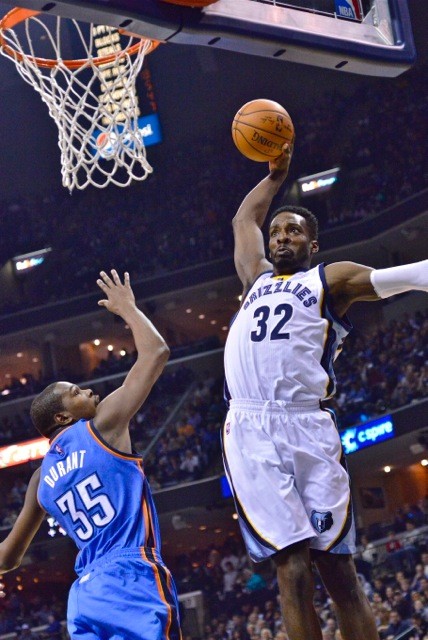 Larry Kuzniewski
Larry Kuzniewski
Alas, Jeff Green’s tenure as a Grizzly never really worked out, but they got a protected first round pick for him.
The Grizzlies have traded Jeff Green to the Los Angeles Clippers in exchange for a lottery-protected 2019 first round pick and guard Lance Stephenson. In doing so right at Thursday’s trade deadline, they turned an OK trade period—yesterday they turned Courtney Lee into PJ Hairston, Chris Andersen, and four second-round picks—into an unqualified success.
In turning two players who were playing well but underperforming into a first round pick (which might actually convey, assuming the Clippers make the playoffs that year), four seconds (though one is so protected it probably won’t ever make it to Memphis), a young guy who hasn’t lived up to his promise, a big to replace Ryan Hollins at the end of the Gasol-less frontcourt rotation, and whatever you want to call Lance Stephenson (a.k.a. “Born Ready” a.k.a. “This Guy Will Be Gone In A Couple Months”)… the Grizzlies really did well.
This is the kind of smart deadline those who watch the team were hoping they’d have: moving guys on expiring deals to teams willing to give up assets in exchange. The players the Grizzlies got back are pretty much all certifiably insane—and now they’re on a team that already had Zach Randolph, Tony Allen, and Matt Barnes—but the bet here is that (1) these guys are all going to be gone at the end of the year anyway, but those draft picks won’t and (2) the Griz may or may not make the playoffs anyway, so why not shore up their position for the future?
It’s going to be interesting to see how this works out on the court. Lee’s usage was pretty easily replaceable but the bulk of Green’s minutes now will probably be split between Matt Barnes and, well, Vince Carter? I’m not sure who’s going to be the bench 3 now. It could be James Ennis, recently recalled from the Iowa Energy. Maybe Stephenson will play backup 2 and Carter will slide over to small forward.
An ideal rotation might look a little something like (UPDATE — Now that it’s confirmed that the Grizzlies aren’t going to waive Stephenson, this is a better guess):
- Conley / Allen / Barnes / Randolph / Wright
- Chalmers / (Stephenson / Carter / Ennis wing bench wings) / Green (there’s only one now!) / Andersen
…at least, until Jordan Adams returns from his knee surgery, which will hopefully happen before the end of the season. I don’t expect Stephenson to play much, but if he can tamp down his insanity, he might be a nice addition off the bench. That’s a pretty big “if” though.
There’s something to be said for the comments that in adding Hairston, Andersen, and Stephenson, all guys with histories of off-court issues (well, and on court ones too), the Grizzlies may have added too much “crazy” to a locker room that already has some pretty outsized personalities, but I’m not sure I buy it. These guys are crazy, but they’re not stupid. The Grizzlies’ locker room has very solid leaders, who will keep guys in line (especially Zach Randolph and Tony Allen, in terms of keeping personalities in check).
The on-court fit is secondary to the haul of draft picks, of course. Once it comes time to sign free agents, the Grizzlies’ basic position is the same, except now they have a few more little pieces to work with if they’d like to facilitate a trade into their cap space instead of a signing. It’s a bet on the future, a recognition that they need to prepare for the road ahead, even if it costs them games in the short term—which, let’s be honest, might happen, especially at first with so many new guys to fill what had been established roles in the rotation (and I count the returning Brandan Wright in that, too).
This is exactly the kind of trade deadline the Griz needed to have if they were going to prove to the world that they recognized the importance of the future over the “now” (and even over next season). Plus they stuck the Clippers with Jeff Green, who—though he’s had some great games this season—caused more chemistry problems on the floor that he was worth.
We’ll see these guys in action tomorrow—Hairston and Andersen both practiced with the team today. More on this as it develops.